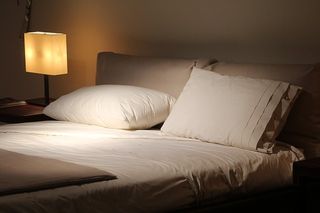Depression
Sleepless and Depressed? CBT-I Can Help.
New research suggests we can treat insomnia and depression at the same time.
Posted October 26, 2016

If you’ve ever been depressed or anxious you probably know firsthand that these conditions are linked to sleep problems. Research studies have shown that as many as one-third of individuals with anxiety or depression have severe insomnia.
So do anxiety and depression cause insomnia or does insomnia cause these mental health conditions? There’s evidence that the causal arrows run in both directions. More than one study has shown different patterns of insomnia onset in depression vs. anxiety, with anxiety more likely to precede insomnia (Anxiety → Insomnia) and depression more likely to start after insomnia (Insomnia → Depression). In fact, there is strong evidence that having insomnia more than doubles the risk for developing depression.
Traditional clinical wisdom suggested that when depression and insomnia were both present, the depression should be treated first, with the hope that improvements in sleep would follow. In some cases effective treatment of anxiety or depression can improve co-occurring insomnia.
However, insomnia often sticks around even after the anxiety or depression is better, which is not only miserable but makes it more likely that the anxiety or depression will return. Therefore it’s important to address the sleep problems directly.

Following healthy sleep habits can go a long way toward promoting good sleep (a list is here). There are lots of good sleep resources on the web (including a few here), and professional help may be needed in some cases. Cognitive-behavioral therapy is the first-line treatment for insomnia based on its strong research support.
So if you suffer with both depression and insomnia, there's reason to hope. A recent study found that just 4 sessions of research-based talk therapy for insomnia can help with both conditions, leading to big improvements in insomnia and moderate improvements in depression. Results from another recent study suggest that improvements in insomnia drive the decrease in depression.
The treatment for sleep problems in these studies was cognitive-behavioral therapy for insomnia (CBT-I), which includes several highly effective components. For example, activities in the bedroom are limited to sleep (sex is the one exception), so that the mind and body learn that "Bed = Sleep." CBT-I therapists also work with patients to identify an optimal bedtime and wake-up time to promote a consistent circadian rhythm and efficient sleep. (I explain more about the principles of CBT-I in this earlier post, "The Most Important Way to Fight Insomnia.")
The results of these studies have clear implications for the treatment of co-occurring depression and insomnia. Therapists should consider directly treating the insomnia in conjunction with depression treatment, using a well-validated treatment program like CBT-I. This approach is likely to maximize patient gains and promote long-term wellness.
It’s tough to be hit with the one-two punch of depression plus insomnia. The good news is that effective treatment can improve both depression and sleep. And of course good sleep helps with pretty much everything.

Find me on the Think Act Be website, Facebook, and Twitter.
Looking for self-directed CBT for depression and anxiety? Retrain Your Brain: CBT in 7 Weeks is available in paperback and Kindle.
Sign up for the Think Act Be newsletter to receive updates on future posts.


